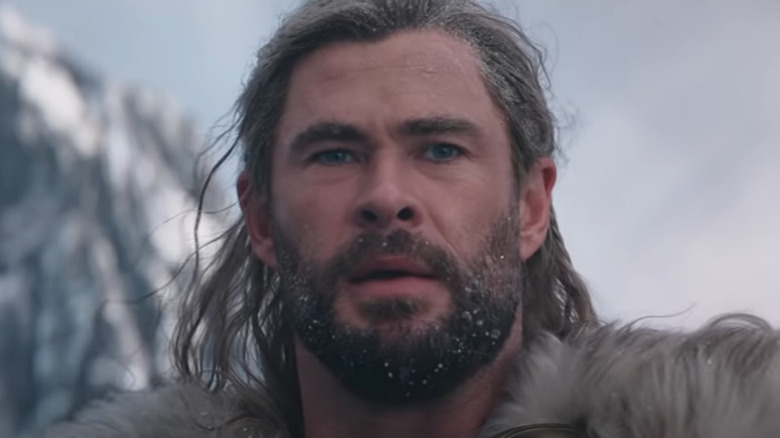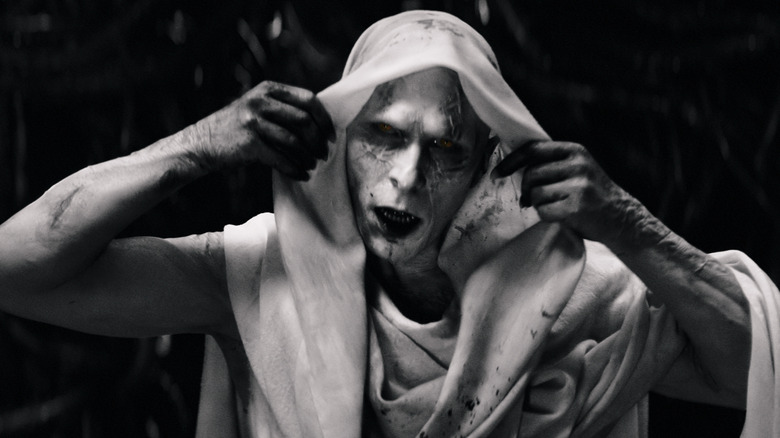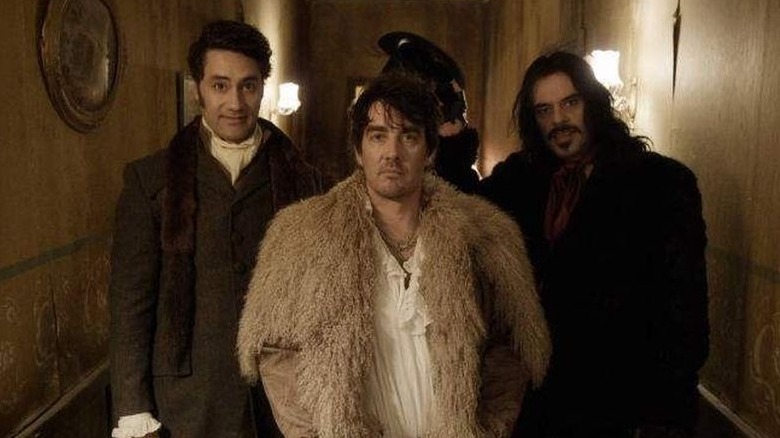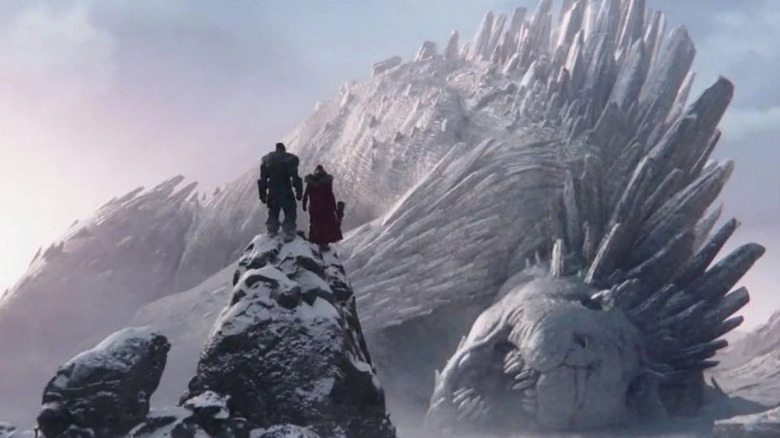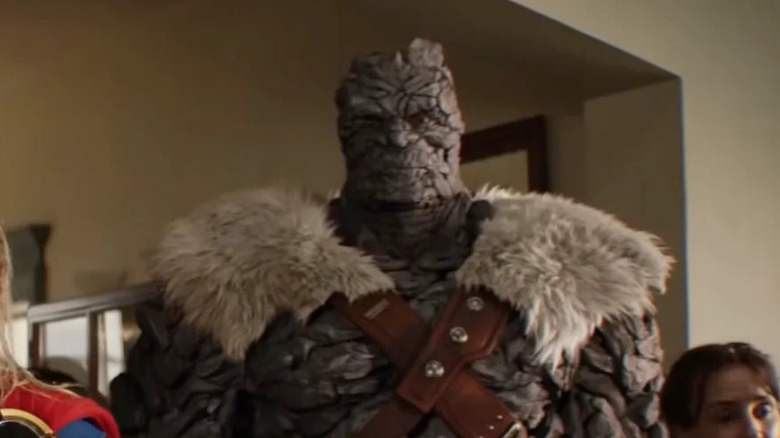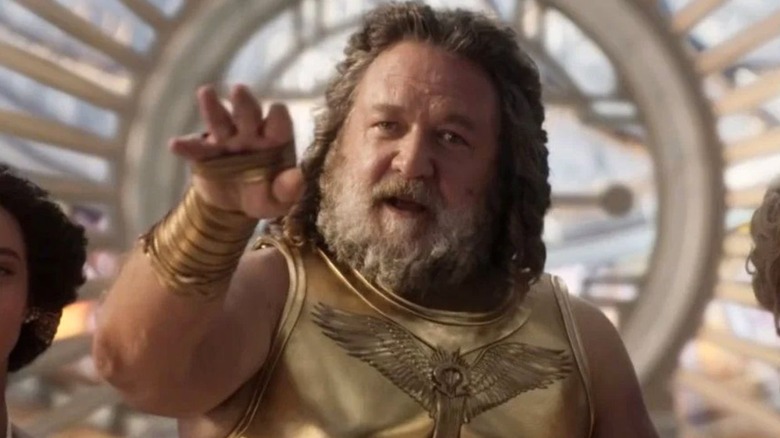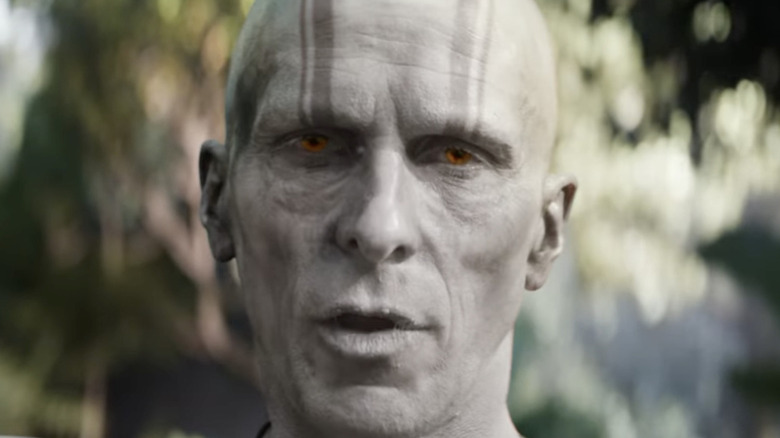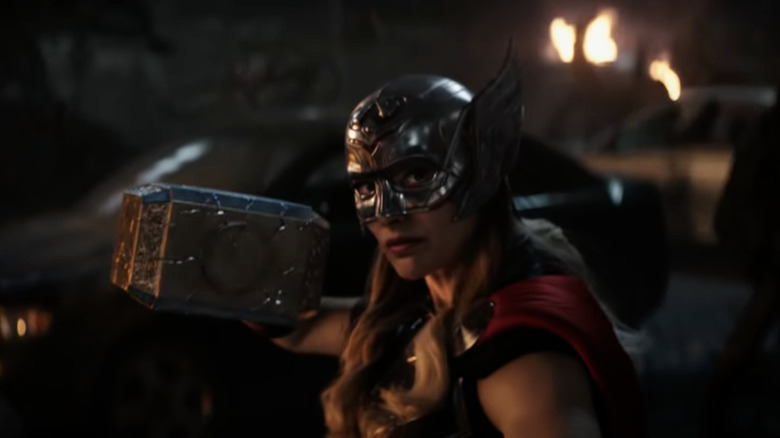Every Character That Died In Thor: Love And Thunder
When the villain of a movie is nicknamed "The God Butcher," it's safe to assume not every otherworldly being is going to make it out alive. The 29th MCU installment seemed poised to do damage to Marvel's ever-growing roster of supers when Gorr proclaimed in the trailer that, "all gods will die." In fact, some fans speculated that even Thor, the God of Thunder himself, might perish in his fourth solo film.
So, who really bites the dust? That's a complicated question when it comes to MCU characters, who've been known to pop up posthumously in alternate timelines and dimensions with regularity. "Thor: Love and Thunder" is surprisingly and refreshingly more intimate than most latter MCU films, especially ones that take it upon themselves to hop around different galaxies and planes of existence, which means there isn't necessarily Infinity War level destruction going on, despite Gorr's ambitious goal. But still, there are more deaths per capita than audiences might expect, and that's even more true considering that the Thor four-quel is just as much of a screwball Taika Waititi comedy as it is a franchise action-adventure. As is usually the case in PG-13 stories about fantastical realities, not all of those deaths take. However, the ones that hold are real tearjerkers, and some of the ones that don't are still pretty affecting. These are the characters who met their ends in "Thor: Love and Thunder."
Gorr's daughter
Taika Waititi is a master at blending absurd comedy with emotional storytelling, especially when it comes to kids and their parental figures (see: "Boy," "Hunt for the Wilderpeople," and "Jojo Rabbit"). "Thor: Love and Thunder" eventually fits that mold as well, but it starts off on a note that's completely humorless, unexpectedly dark, and almost too tragic to be believed in what was advertised as a zany MCU movie.
In the opening scene of the film, Gorr and his daughter — whose name we don't know — are seeking shelter from destructive sandstorms and looking for so much as a drop of water. Despite Gorr's prayers, their planet has become uninhabitable and their civilization has been lost. The girl doodles on rocks while Gorr prays to his god, Rapu. Some time — it isn't clear how much — passes, and Gorr holds his child in his arms as she's dying of thirst. Both of their lips are dry and cracked, their skin has been ravaged by the elements. She tells him that she's tired before she passes away in front of his eyes. He buries her on his home planet and decorates her grave with rocks.
Though the audience surely goes into "Love and Thunder" expecting to root against Gorr, this scene is played with such devastating realism that you can't help but mourn for the little girl and sympathize with her father, who becomes "The God Butcher" because of this seismic loss. It's a bold choice for any film to open with a scene that so effectively makes you feel for its villain; it's a particularly gutsy one for a superhero film with blockbuster aspirations.
Rapu
It's a sad irony that Gorr spots an oasis only after his dear daughter's death. As he stumbles over to the tree-lined watering hole, he can't quite tell if what lies before him is real or an illusion. He collapses into the water, then notices something rustling behind all the greenery. It's Rapu (played by Waititi's "What We Do in the Shadows" movie co-star, Jonathan Brugh), the god to whom Gorr had been praying, decked out in gold with an ostentatious headpiece.
Gorr assumes Rapu is welcoming him into the afterlife. He shows Rapu the pendant he wears around his neck to mark himself as one of his followers. But Rapu isn't there to save anybody. He's chilling with the flower gods and has long been entirely indifferent to the suffering of Gorr's people (indeed, over-indulgent gods who aren't paying enough attention to the plight of their masses is a recurring theme in "Thor: Love and Thunder").
Rapu's main concern is the existence of the Necrosword, a weapon that can kill gods (at a price) and that conveniently now rests near Gorr's right hand. When Gorr tells Rapu that his kingdom has fallen, the god shrugs it off and says there will always be new souls to worship him. He breaks the bad news to his last remaining devotee; there is no eternal reward. That enrages an already spiritually-broken Gorr, who rips the religious pendant from his neck and is suddenly able to wield the levitating Necrosword. He uses it to stab a taken-aback Rapu in the throat, and it's implied he decapitates him to finish the job.
Falligar the Behemoth
After he becomes aware of Gorr the God Butcher, Thor discovers distress signals from all across the universe. In one, he sees Lady Sif (Jaimie Alexander), gravely injured. Thor and Korg make haste to try and rescue his fellow Asgardian warrior, but when they arrive, they're not so pleasantly greeted by the mountain-sized corpse of a frost-covered creature. Korg asks who or what it is, and a clearly-shaken Thor replies that this is Falligar ... one of the nicest gods anybody could ever hope to meet.
The still above was used in the promotional material for "Thor: Love and Thunder" and it intrigued comic book fans, as it's a pretty precise recreation of a panel from "Thor: God of Thunder" Vol. 1 #3. Though the film doesn't get into much detail about Falligar or his relationship with Thor at all, both use him in much the same way.
On the page, Falligar is an old friend of Thor's who rules over the Galactic Frontier and enjoys sparring, even against black holes. After some years apart from each other, Thor learns that Falligar is dead at the hand of Gorr the God Butcher. Thor's line to Korg suggests they had a similar friendship in the MCU, and here too, he meets his end because of Gorr's vow to wipe out all the gods. Though his enormous, lifeless body makes for a breathtaking shot composition, it's a shame Marvel fans don't get to see this peculiar, majestic god in action.
Korg
Okay, so Korg doesn't technically die — but for a moment there, it really looks like everyone's favorite failed Kronan revolutionary is a goner. During the gods-on-gods melee at Omnipotence City, Korg takes a particularly strong hit. The camera focuses on his wide eyes for a split second before he crumbles into a literal pile of rocks. A distraught Thor rushes to his side as Korg cries out, fearful that he's dying. In the midst of the violence and chaos, Thor tries to reassemble his friend, Humpty-Dumpty-style, but it's no use.
Thor then hears Korg's familiar voice again and lifts his face — like a Korg mask — from the rubble. Korg either realizes or remembers that the only part of a Kronan that's really alive is their mouths, which is funny given his species' proclivity for verbosity has been the subject of an MCU joke before. In "What If...T'Challa Became a Star-Lord?" the Collector quipped that the rock arm he uses as a weapon is something he "hacked off the carcass of a terribly chatty Kronan." For the rest of the film, save for a final montage, Korg is but a face — albeit, one that nevertheless gives good advice about love.
At least some fans will be relieved that Korg's death was a fake out. Rumors and leaks persisted that the character, voiced with flair by writer-director Taiki Waititi, was on the chopping block and wasn't likely to survive the film.
Zeus
In a standout scene, Thor — along with King Valkyrie, Jane (as Mighty Thor), and Korg — sneak into Omnipotence City wearing stolen cloaks, where they hope to somehow convince Zeus and the other gods to help them in their fight against Gorr the God Butcher. Valkyrie and Jane want to kick some butt, but Thor thinks he can reason with the Greek god of all gods and secure an army. As soon as Russell Crowe's Zeus makes his grand entrance, however, it becomes quite obvious that this plan isn't going to work. This Zeus is past his prime and espouses some questionable political opinions, which is hard for Thor as (he admits) he modeled some of his own thunder schtick off of Zeus's whole lightning deal.
After Zeus restrains him, "flicks" off his clothes, then refuses to aid them and instead declares his intention to keep Thor prisoner in the city, the gang has no choice but to battle back. Thor steals the golden lightning bolt from Zeus, throwing it like a javelin clean through his one-time hero's chest. Zeus tumbles from his floating alter, not to be seen again for the rest of the movie proper's runtime. Thor is certain he's dead, which means he's put himself into a bit of a pickle that will have to be dealt with after they defeat Gorr.
But wait. In a mid-credits stinger, a seemingly-still-mortally-wounded but conscious Zeus is being put back together by his "Zeusettes." He charges his son Hercules (Brett Goldstein) with tracking down the God of Thunder, likely setting up a future Thor adventure.
Gorr
Thor and Mighty Thor team up to successfully destroy the Necrosword, but they don't do it quick enough to stop Gorr the God Butcher from using Stormbreaker to open the gate to Eternity. As Gorr walks through the circular door into Eternity's realm and stands before the powerful living cosmic entity (represented as a galactic silhouette) Thor tells him that he has won. Meanwhile Jane, who used her last ounce of strength as Mighty Thor to wield Mjolnir against the Necrosword, falls to the watery ground as a terminal cancer patient once again. She and Thor have one final conversation that moves him, and he changes his plan.
Gorr comes to realize that — with his one wish to Eternity — he could bring back his daughter rather than exterminate the gods. However, the Necrosword corrupted his own body so thoroughly he knows that — like Jane — he's about to die, as well. Even though he won't be around to see the ramifications of his choice, Gorr decides to give his daughter another chance at life rather than fulfill his vow of vengeance. Jane promises that she won't be alone, and Gorr lives just long enough to say goodbye to his resurrected child and to ask Thor to promise to protect her.
In the scene that follows, we see Thor has adopted "Love" and is raising her to be an Asgardian warrior, like him. Gorr redeemed himself (if not in the eyes of all the gods, at least Thor's) by making a final choice of Love instead of hate.
Jane Foster
Early on in "Thor: Love and Thunder," the audience learns that Jane has been diagnosed with stage 4 cancer and it isn't responding to treatment. While in her office, she flips through an old book of Norse mythology and notices the word Mjolnir. Feeling called to her ex-flame's former weapon, she travels to New Asgard incognito and tries to summon the hammer.
We learn from a montage of their relationship that Thor once ordered Mjolnir to protect Jane, his true love. This produced powerful magic that bound the hammer to Jane, and for awhile, Jane and the audience think that magic is healing her as it gives her superhuman strength. But when she lands back in the hospital, worse for the wear every time she suits up as Mighty Thor, she figures out what's really going on. Mjolnir is actually using up her remaining life force. Once Jane comes clean to Thor about her condition, he begs her not to pick up the hammer again, telling her that he loves her. He hopes that they can find a cure and still have a chance at a life together once he returns from facing Gorr alone. Jane understands his request, but she knows there's likely no cure.
Jane joins her love for one last classic Thor adventure, and with her dying breath, tells him that she's content she lived an extraordinary — albeit short — life for a human. They end their relationship on sad but good terms as she vanishes into a wisp of glitter.
An optimistic end credits scene reveals that, since she died a Viking on the battlefield, she's welcomed into Valhalla by none other than Heimdall.
